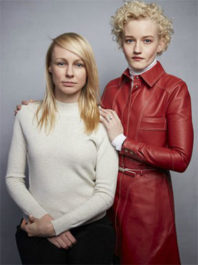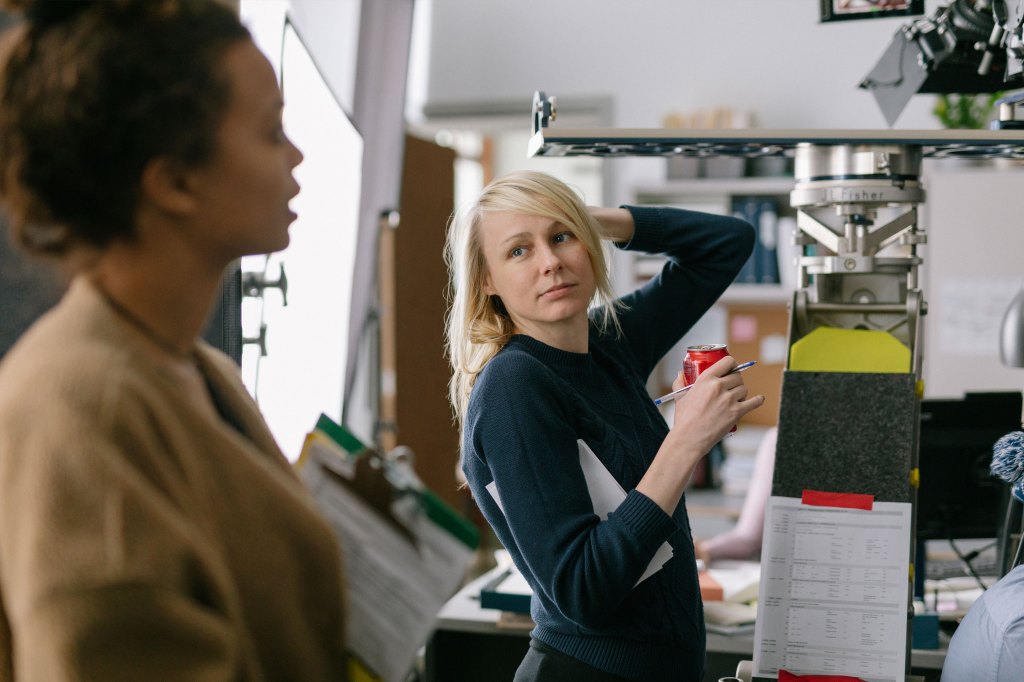
Very often…the work place is not a safe haven…
In The Assistant we follow one day in the life of Jane (Julia Garner), a recent college graduate and aspiring film producer, who has recently landed her dream job as a junior assistant to a powerful entertainment mogul. Her day is much like any other assistant’s – making coffee, changing the paper in the copy machine, ordering lunch, arranging travel, taking phone messages, on boarding a new hire. But as Jane follows her daily routine, she, and we, grow increasingly aware of the abuse that insidiously colors every aspect of her work day, an accumulation of degradations against which Jane decides to take a stand, only to discover the true depth of the system into which she has entered.
While the nature inclination is to focus on the entertainment industry, the kind of abuse that we see in this film is rampant for women across a wide variety of industries, which is what inspired Writer/Director Kitty Green to knuckle down and tell this story in a very cold, matter of fact type fashion.
We got the pleasure to talk with her about the complex nature of the gender dynamics in the film, finding the right way to tell this story and the importance of conversation and god willing finding a way for us all to treat each other just a little bit better going forward.
Dave Voigt: Obviously congratulations on the film and I think what really spoke to me about it is while there are the immediate parallels that many will draw from it with us all being in the entertainment industry, this applies on such a larger scale then we ever really care to admit. With this being your first narrative feature as well what was the impetus or drive for you to tell this story in this way?
Kitty Green: I’ll admit that I interviewed people in the film industry first and foremost when putting this story together and they just had some unbelievably crazy stories with yachts, bizarre locations and suitcases full of cash but I was less interested in those stories and more so the ones that felt relatable to any women that has ever worked in any kind of office and ultimately that became the goal. I know it sounds kind of boring but there was much more compelling material in the ordinary rather than the extraordinary when combing through all of this. And the last film that I made about Jon Benet Ramsey was very much a documentary/fictional narrative hybrid, kind of going half/half with it. Plus there was nothing really all that new in the film from a facts standpoint and my big thing was trying to find the best way to make the material as emotionally compelling as humanly possible.
We’ve all heard the stories about women getting ignored in the workplace and we’ve all brushed it off to just move on and get over it, but when you actually see it play out it’s a lot clearer how these things can really strip someone of their self worth. I really wanted to put the audience in the shoes of someone with no power so they can experience that “death by 1000 cuts” which can be far too common in a lot of work scenarios.

This is the kind of movie where if you don’t find the right actor for the job, it can all fall apart. Can you talk a little about the casting process and finding Julia Garner because she really delivers this gut punching performance by wearing the pain of a situation on her face and uttering as few words as humanly possible.
Because there’s barely any dialogue in the film I said to the casting agent how I needed someone who was just infinitely watchable from the get go. I needed someone who you’d be drawn to watching perform even the most mundane of tasks. Julia’s name was one of the first that came up and immediately I just thought “yes”. She has such a striking look, and I’ve loved her work from when I first saw her on The Americans. She’s very expressive and we can see the wheels turning when she’s in a scene and when we initially met I showed her the script and she “got it” and truly understood what we we’re trying to do. Everything really just worked out and as clichéd as it sounds working with Julia really felt like it was kind of meant to be on this one.
I was also so struck by the power dynamic in the film between the men and the woman; particularly the scene where she’s having to write that e-mail apology to her boss and the men she works with are helping her but at the same time participating in the belittling of her on a daily basis and seeing how people can offer help but also not necessarily in the most positive of ways. It all really illustrates how complex and emotionally harrowing that dynamic can truly be in a toxic workplace.
It’s funny because I just had a conversation with someone who had a big fight with their friend over that scene insisting that the men weren’t trying to be helpful at all, they we’re being patronizing and condescending. And sure there is a little bit of that because she obviously knows how to write an e-mail it’s also them trying to teach her that this is just how this company works, for better or for worse. If you want to work here, these are the rules you have to play by, and yes they are unwritten rules but you just learn them through trial, error and a fair bit of anguish along the way because even her higher ups, like the scene she has with Matthew McFayden is so great because while she has a certain amount of information she feels obligated to report, his job is to protect the company and make her doubt her core reactions to everything that she’s been seeing go on while working there. 
And especially in these days of #MeToo and everything that has been or is still going from either sexual assaults in the work place or plain old berating employees for the sheer sport of it, these are things that are rampant across so many industries and while the instinct and desire to believe all these stories it also gets down to the root that these things are so impossible to prove on a daily basis and boiling down to one person’s word against another, because as much as we know what might be going on, proving it can be another. As a storyteller was that a main drive for you to really visualize and make us experience these things that are empirically quite impossible to prove unless we witness it first hand?
It’s definitely one of the ideas that I was excited about exploring because often in real life when we see someone like Julia’s character it’s far too easy for us to label that person as an enabler, but the reality is that she just doesn’t have enough information to do anything meaning about it other than probably getting herself fired. I wanted to demonstrate what it would be like to be the youngest woman in a situation like that.
While we’re all drawing the entertainment industry comparison, especially considering what’s playing out in the news these days I would imagine that your script is more of a composite of many stories rather than just one. I’m curious to know how extensive did you have to get with your research in order to find the right mixture while writing the story?
 Oh for sure it is and I mean I went from New York to LA to London to Melbourne Australia and I was hearing the same stories over and over again. Not just the film industry but in tech, financing, engineering and many others. There are assistants all over this freakin’ world and they had some stories to tell. It’s not just about Harvey Weinstein because there are so many systemic problems out there with toxic behaviour across so many industries and platforms that we really need to start having some constructive conversations about the state of the work place, which is really the reaction that I’ve been hoping to get out of people during this whole process.
Oh for sure it is and I mean I went from New York to LA to London to Melbourne Australia and I was hearing the same stories over and over again. Not just the film industry but in tech, financing, engineering and many others. There are assistants all over this freakin’ world and they had some stories to tell. It’s not just about Harvey Weinstein because there are so many systemic problems out there with toxic behaviour across so many industries and platforms that we really need to start having some constructive conversations about the state of the work place, which is really the reaction that I’ve been hoping to get out of people during this whole process.
We can see that Jane is having a pretty bad day, but there are so many people out there who are having worse days then she did, and it’s happening every day.
It’s that last scene in the film with Jane just in the coffee shop with the stale muffin and her blank stare out the window, it’s where we all can really connect with this story in so many ways because we’ve all been there in some shape or form when we see the look on her face. It feels so universal and serves as a reminder that even some of the jobs that look glamorous on the outside, can truly fucking suck the life out of you some days when you’re in the middle of it.
Oh that’s VERY true, I spent 10 years on the film festival circuit and I’ve had my fair share of terrible experiences which is at least partly where this all came from for me. When you have those kinds of moments of anger and frustration is very natural to need some kind of cathartic release which I think is happening with the film. I’ve had some bosses come out of watching resolved to treat their staff better tomorrow or seeing that maybe they’ve handled a situation badly and have assistants handling way too much for them. I like the idea that’s it’s got people thinking about their own kind of behaviour and it sparks conversation that we’re ALL kind of complicit in a work place system that can sideline women and that we all need to put in a little more work to just try and treat each other a little better.
The Assistant is in theatres across Canada now.

